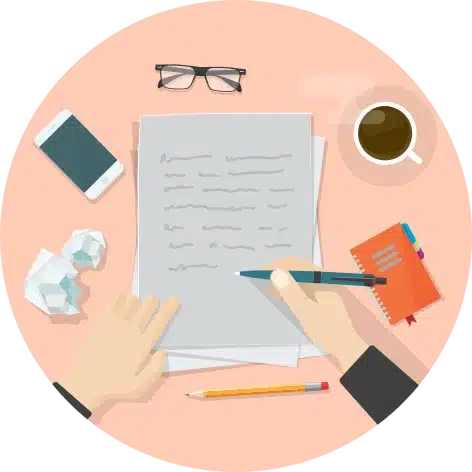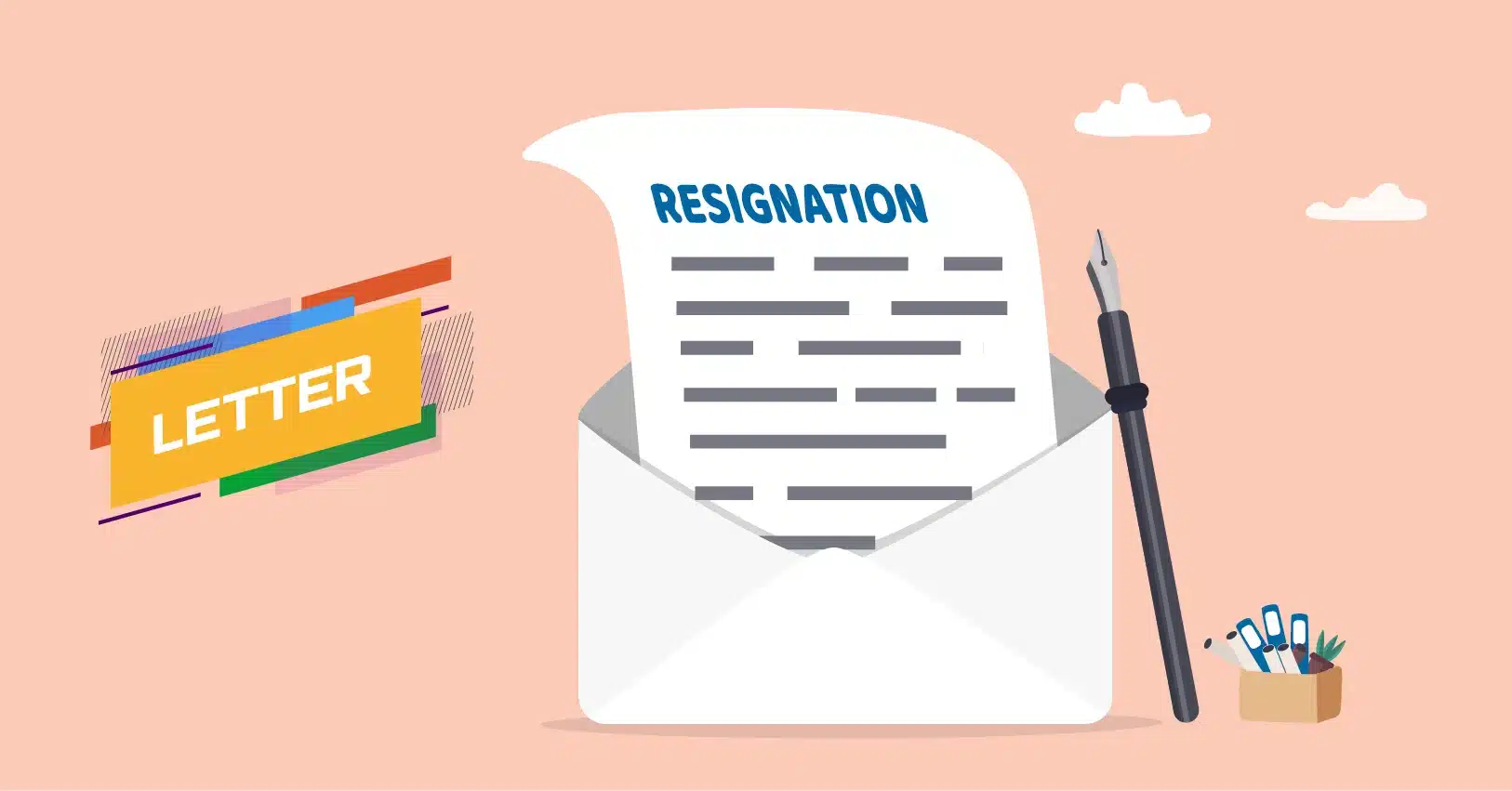SUMMARY: While quitting a job does not always require a resignation letter, it is prudent to write one anyway. This article explains how to write a resignation letter well that your boss will appreciate. We provide a resignation letter template, resignation letter samples that you can refer to when crafting your letter, and some tips on what to include and what to leave out.
Leaving your job is a major decision often followed by significant events like moving to a new town, changing your kids’ school, and more.
But before this, it is considered a professional courtesy to notify your current boss that you are resigning, best done through a well-timed and politely-worded resignation letter.
Read on to learn why and how to write a resignation letter—what to include, what not, and more. Follow CVJury for all your job-finding tips.
What Is a Resignation Letter?
A resignation letter is a formal notice that informs your employer or HR Manager that you are leaving your current position with the company.
It is a formal notification of your resignation from your current job and is intended to help the firm plan for your departure.
Reasons to Write a Resignation Letter
One of the main reasons you should write this formal notification is to make your resignation effective and to allow you to leave the company on a good note.
Depending on how you word the document, it can usher in more positive experiences and create opportunities for networking and referrals from your supervisors and colleagues in the future.
Other reasons you should learn to prepare a resignation letter include the following:
1. Company Policy
Whether or not you must prepare a formal document depends on where you work.
Some regions, industries, and companies make resignation letters and a notice period of about two weeks a requirement for leaving a job.
If this applies to where you work, you can ask a former company employee if they wrote a letter when they left or consult a trusted member of the HR department in your firm.
2. Paper Trail
Beyond company traditions, a resignation letter creates a paper trail, allowing for proper record-keeping.
It will go into your personnel file as evidence of how, when, and possibly why you left a company and can come in handy during your transition when receiving your final paycheck or in your next job.
3. Professional Courtesy
Telling your boss that you are resigning from your job is bound to be nerve-wracking.
But while your instincts may tell you to avoid this conversation, a resignation letter is a courteous way to avoid blindsiding your employer and co-workers.
It can help you maintain an excellent professional relationship with people in the company that could help your career down the road.
4. Control
Lastly, writing a letter of resignation lets you control the narrative about how and why you left a company.
This is especially important when you are worried your boss may try to spin the story to discredit you. You can send your boss and the HR department a copy of the letter.
“Never use a resignation letter as a manipulation technique to get better pay, perks, or a promotion—it might backfire, and you could lose your job. If you have grievances with your current workplace situation, discuss them over a meeting with your employer.”
Expert Advice

Like this post?
Sign up for our blog updates and never miss a post. We’ll send you A FREE job interview eBook as a thank-you.
Elements of a Resignation Letter
Now that you know the why let’s dive into how to write a resignation letter. The first step to writing a good resignation letter is understanding the critical information it should contain. These elements are:
Statement of Resignation and End Date
You should always begin your letter of resignation with a simple statement explaining why you are writing: to notify your employer that you are leaving your job.
Follow up with the date of your last day at work and the duration between it and the current date to help your employer plan for your departure.
Essentially, the first part of this official document should look something like this:
“I am writing to inform you that I will be resigning from my position at {company name} as {job title}, effective {resignation date}.
Statement of Gratitude
The second component of a letter of resignation is a statement of gratitude thanking your boss for the opportunity to work with the company and for the positive aspects of your job.
In this section, it is best to be very specific. How did your soon-to-be ex-boss help grow your career? What are some things you wish to express gratitude for, you may ask? Here is an example:
“I am grateful for the mentorship and support I have received at {company name} over the {duration} I have worked here. Your {positive qualities} have been influential to who I am as a {title}.”
(Optional) Reason for Resigning
You do not have to tell your boss why you are leaving your job, especially if you are exiting the company to join a rival firm.
However, if you would like to, you can share some information about your next move, such as:
“I recently accepted a position as {new position name} in {state name}. I have to move to {be closer to my parents/further my career/change my focus/etc.}”

Transition Details
In the next section, mention whether you have any pending projects and how you plan to handle them before you leave.
It is also best practice and courteous to offer to help with the transition process, such as by orienting your replacement, but whether the company accepts your offer will ultimately depend on your manager.
You can extend a general offer, like:
“If there is any way I can help ensure a smooth transition, please let me know.”
Personal Contact Information
The last key element of a good resignation letter is your new contact information, including your email address.
You don’t need to include it, but it is best if you want to keep in contact with your managers or colleagues.
Essentially, you are providing them with a new way to contact you since you will no longer use your company contact details. You can write something like:
“Thank you very much for the opportunity to work with you. I look forward to staying in touch. Feel free to contact me at {contact information}.”
What Not to Include
Just as there are details that should be included in your resignation letter, some things are best left out. They include:
A discussion on how fantastic your new job or new employer is, how much higher your salary will be, or how excited you are to be leaving the company.
Critiques or complaints about your supervisors, colleagues, or the company.
Overly emotional sentiments about how you will miss everyone. Remain professional and save your goodbyes for face-to-face conversations.
Profane or obscene comments about your employer.
Any grievances with the company as a reason for leaving would be significant. These concerns are best addressed with HR and should not be included in your resignation letter.
Try to keep your resignation letter as simple as possible. Get straight to the point, keep things simple, and leave things positive.
Even if you have a reason to be angry, writing a scathing resignation letter can burn professional bridges you might need later.
How to Write a Resignation Letter (Resignation Letter Template)
{Your Name}
{Your Address}
{City, State, Zip Code}
{Date}
To
{Your Employer’s/HR Manager’s Name}
{Their Title}
{Company Name}
Re: Resignation Letter
Dear {Recipient’s Title and Name},
I am officially resigning from my position as {title} with {company name}. My last day with the firm will be {resignation date}, {duration from today}.
I am grateful for {positive attributes about the company or your employer} and how {ways they have helped your career}. It has been a sincere honour to work with you and the team.
If there is any way I can help make the transition process more accessible, please let me know.
Best regards.
Thank you.
Sincerely,
{Your Signature}
{Your Name}
Sample Letter of Resignation After Talking to Your Manager
Pro-Tip: It is never a good idea to ambush your supervisor or employer with a resignation on the final day, especially if you have a good working relationship.
When you decide to quit your job, you can schedule a meeting with them to discuss your intentions. You can then go ahead and follow up with a formal resignation letter.
Re: Resignation Letter
Dear Mr Jarvis,
As we talked about, I’m resigning as Sales Manager at ABC Company, effective 30 November 20XX. I previously mentioned my plan to change my career path and venture into the field of Engineering, and now is a good time.
Working with you and your team has been an absolute pleasure, and I am grateful for your support and steady guidance throughout the years. If I can make the transition period smoother, please let me know. I have completed all my projects as we agreed.
I wish you and the ABC family all the best. I hope to keep in touch. You can contact me at my new email, jonathandroff@email.com.
Sincerely,
{Your Signature}
Jonathan Groff
Sample Formal Resignation Letter Due to Family Reasons
Re: Resignation Letter
Dear Mrs Finkle,
Kindly accept this formal notification of my resignation as Senior Branch Manager, effective 25 November 20XX. As I shared with you, I have decided to stay home for a while and raise my recently-born daughter.
I will be available for the next two weeks to help with the transition in any way I can. Thank you for your continued support and understanding in this matter. It has been a pleasure working with you.
Sincerely,
{Your Signature}
Mary Watkins
Sample Resignation Letter Due to Relocation
Re: Resignation Letter
Dear Ms Davis,
I am writing to officially resign from my position as Accounting Manager at XYZ Company. My last day with the firm will be 20 November 20XX. I have decided to move to England this summer for an educational opportunity that will further my career.
While I look forward to it, it is not lost on me how much you and the team have impacted my career. I am grateful for the support and mentorship you have extended me.
Please let me know if there is any way I can help with the transition. Best wishes, and I hope to keep in touch.
Sincerely,
{Your Signature}
Kendrick Jefferson
Sample Resignation Letter Due to A Change in Career
Re: Letter of Resignation
Dear Mr Jeremy Booker,
Please accept my formal resignation from my position at JKL Initiative, effective two weeks from now. After re-evaluating my career goals, I have received a job at a Pharmaceutical firm, where I can put my Chemistry Degree to use best.
I have enjoyed working as a Marketing Manager in your company these past ten years, but it is time to re-align my career path with my current job. Thank you very much for your support and encouragement. It has been an absolute honour to work with you.
Please let me know if there is any way I can help ensure a smooth transition for my replacement. I’m looking forward to our paths in the future.
Thank you, and good luck.
Sincerely,
{Your Signature}
Jane Goodwin
“While you may intend to remain with the company for a few more days or weeks, some employers may ask you to leave after you deliver your resignation letter.
Always prepare for an immediate departure. Prepare your resignation letter and plan your finances, travels, etc.”
Expert Advice
Should You Use Your Letter of Resignation to Make a Point?
Sometimes, you leave a company for negative reasons, such as toxic company culture, workers’ rights violations, or workplace harassment.
You’ll then need to figure out whether to use your resignation letter to call out these negative aspects of your former company.
As experts say, doing so is risky, and you must be ready to deal with the repercussions.
These may include losing a future reference from your employer or tarnishing your professional reputation.
Therefore, always weigh the benefits and downsides and decide if the problem you point out in your resignation letter is the hill you want to die on or something better left for another day.

Frequently Asked Questions (FAQs) About Resignation Letters
Must you write a letter of resignation when you leave a job?
Some employers do not require a formal letter when you quit your job, but writing one is a requirement in some companies.
Always consult with the HR department in your firm or colleagues on the best way to handle a resignation.
But even when a resignation letter is unnecessary, it is a professional courtesy that most employers appreciate.
How much notice should you give when you resign from a job?
Standard practice is to notify your supervisor of your resignation with ample notice— typically, at least two weeks’ notice before you quit your job.
However, the exact duration will depend on the terms set out in your employment contract.
Can you resign by email?
You can resign by email, but it is generally more courteous to hand-deliver a physical letter of resignation to your supervisor.
Unless you work remotely, and email is the only convenient option.
Can you handwrite a resignation letter?
Yes, you can handwrite a resignation letter. But if your handwriting is illegible, you risk failing to communicate your intention.
Hence, it is best to type your letter and hand-sign it instead.
Key Takeaways
A resignation letter notifies your employer that you are quitting your job.
It should include a statement of intention to resign, your official resignation date, and your new contact information.
While it is not a requirement, a resignation letter can also include a statement of gratitude to your employer and your reason for resigning.
Learning How to Write a Resignation Letter is essential because it allows you to leave a company on good terms and maintain your professional relationships.
When writing your letter, stick to the point, avoid negative narratives, and be courteous.
Leave Your Job on the Best Terms
It would be easy to pack up your desk, leave the office, and never return.
But while this might be a convenient resignation process, it is wise to leave on a positive note so as not to harm your career.
You never know when you will need your former employer to vouch for you, and getting to the last day without saying goodbye can burn your professional bridges.
Writing a resignation letter will only take a few minutes but will set you in the best possible light with your former boss.




